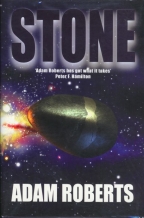Science fiction is a genre that is quite amenable to the novel of
ideas. It's rarely used in that format because it's also quite
possible and usually more sellable to write a science fiction novel
in which ideas take the back seat. Adam Roberts never lets ideas take
the back seat. In 'Stone' ideas are atoms with which Roberts
constructs bombs to detonate in the reader's consciousness. He bucks
trends, evades expectations and challenges the readers to think
themselves into a state of wonder, terror and understanding. We're
all dead alone in Roberts' universe. He'll rebuild yours, bit by bit,
atom by atom. Don't expect your preconceptions to arrive intact.
'Stone' begins as Ae is sprung from an interstellar jail. Ae has
been handed to keys to his jail because he is a rare criminal in the
interstellar utopia of the t'T. The culture of the t'T is based on a
pervasive nanotechnology that acts just as advertised in countless
science fiction novels. Roberts likes to grab big chunks the science
fiction toolkit and use them as building blocks to understanding a
scientific problem from a unique perspective. Ae will be given his
freedom in this universe if he'll perform one simple task --
exterminate the entire living population of a planet. The catch is
that he won't be told who his employer is nor will he be told why he
is to perform genocide. He accepts the offer, then undertakes to
become both the criminal and the detective.
Ae's journey takes him on a tour of the universe of the t'T,
bordered by the fervently religious Wheah and the mysterious
Palmetto. Be assured that Roberts has not bucked the trend without a
fantastic imagination. His version of space travel in the t'T is
excitingly original. His insight into the lone criminal character of
Ae is starkly disturbing. The stresses and self-arguments that Ae
puts himself through are reminiscent of Joyce Carol Oates' psycho
killers. There's a quality of earnestness to the violence that abets
the shock value. If you're reading Adam Roberts, you'd best be
prepared for some pretty unsettling examples of the old
ultra-violence. Roberts operates in the same science fiction universe
as does Anthony Burgess, where a point is made with, well, a point.
In many ways, the hedonistic universe of Roberts' 'Stone' is the
utopia of 'American Psycho'.
But Roberts is up to quite a bit more than polishing a really
nasty character. He is always dealing with the scientific concepts
that fascinate him. Gravity, a big player in 'On' is back again in
the center stage of 'Stone'. The latest discoveries back up some of
the more imaginative creations in Stone's universe. Gravity rivers
and trenches are just now hitting the news, but Stone has
incorporated them into his novel. The quotes that precede the novel
all indicate an interest in quantum theory, and Roberts gives the
reader a delightfully clear and original tour of the implications of
this bit of really, really weird science.
Roberts also plays on the mysteries in this novel like a seasoned
pro. Science fiction and mystery are often mixed, but not in the
fashion that Roberts has managed. Either genre can result in a big
'Wow!' on the part of the reader. Just when you thought that Roberts
had done this repeatedly, he'll manage another revelation that is an
order of magnitude larger than those that preceded. This is the kind
of novel that will only get put down for a moment, as readers rise
and walk around a bit to clear their heads.
Once again, in 'Stone' Adam Roberts has gone in the direction
nobody expected and brought himself there in a fashion nobody else
could have conceived. Each novel from this fantastically talented
author is a quantum leap away from the previous novels, though they
all share an Oates-like dark vision of humanity with an Arthur C.
Clarke-like vision of scientific possibility. It's an intriguing and
enjoyable mix. Roberts manages to mix ideas and humanity while
preserving the pure essence of both. The only thing that takes the
backseat in Roberts' novel is the reader's attention to reality.
